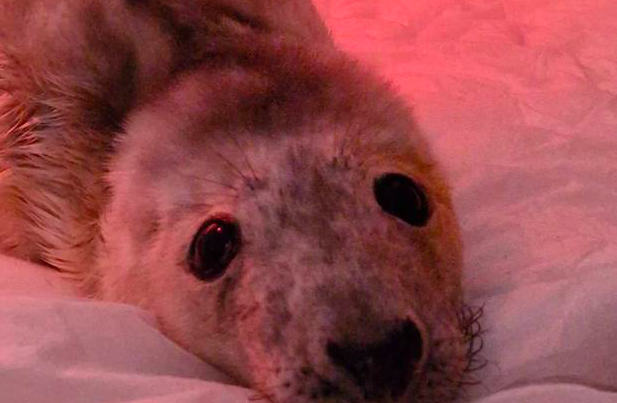


A baby seal pup recovered in Jersey has been brought to Guernsey for treatment and TLC at the GSPCA. He was so little when found he still had some of his umbilical cord attached.
Called Shakespeare, he is being looked after by Geoff George - the GSPCA's Head of Marine Mammals who has helped nurse many seals back to healthy weights already.
Above: Shakespeare arrived in Guernsey this week.
The GSPCA has returned 23 seals back to the wild in the last ten years, and Shakespeare is likely to be just the first of the 2022/23 season.
First discovered by marine welfare group BDMLR Channel Islands, Shakespeare was said to be very small when he was first found and has already started putting on weight.
BDMLR said "he is only days old and has managed to put on 4kg in just a few days from average birth weight by getting mum's fat rich milk. He still had some umbilical cord attached."
The charity is also expecting more seal pups to be found in similar conditions across the Channel Islands.
"Unfortunately with the height of the tides and the windy weather we are expecting more pups to be washed in. However it doesn’t always mean mum has lost them, she could still be nearby and waiting to give regular feeds.
"Please, please if you find a seal pup, clear the area, put dogs on leads and away in the car if possible and then stay back. Never pick up or try and put them back in the water. They are a protected species on the Jersey wildlife law and can give an awful bite."
The charity thanked its support network in Jersey and Guernsey who helped to save Shakespeare including Iris Freight CI and the New Era Veterinary Hospital.
Pictured: Geoff George has nursed other seals back to health, including Andrew (above).
Steve Byrne GSPCA Manager is also expecting to be asked to help with more seal pups over the winter months.
“With rough weather and as we move closer to the winter we often see seal mothers separated from their pups," he said.
“If anyone sees a pup with or without a mum we really do appreciate a call so that we are aware of its location and condition, or send us a few pictures by email or social media, but please don’t approach them and certainly don’t let your dogs get near.
Mr Byrne said it can be quite easy to tell a healthy seal pup from one who needs some extra help.
“For those that don’t know a healthy pup looks like a big, stuffed maggot without a neck. However, a thin pup looks sleek, not necessarily bony and has a visible neck, like a healthy dog."
Shakespeare will be spending time with two other seal pups who are still recuperating at the GSPCA after being rescued earlier this year. They will be released when they are healthy enough to fend for themselves, as will Shakespeare.
Mr Byrne said it will be a while before Shakespeare is released.
“With the two left we hope to get the last two back to the wild soon namely Luna C and Auora, but Shakespeare has a long way to go.
“The pup season is now here and if you do see a seal pup please do give us a call on 257261 or send a few pictures via our facebook or admin@gspca.org.gg so we can monitor them. For advice on what to do and how to identify a sick seal pup check out our advice page.“
Planning permission for wildlife hospital
GSPCA calls for wildlife hospital fundraising after busiest year
Pets being rehomed as owners struggle to afford them
GSPCA called out for a 'snakeaway'
LETTER: If you spot a seal pup
Comments
Comments on this story express the views of the commentator only, not Bailiwick Publishing. We are unable to guarantee the accuracy of any of those comments.